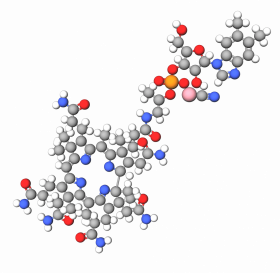A common remedy in medicine and addiction in the food industry, Cyanocobalamin (one of the biologically active forms of Vitamin B12) is a relatively rare ingredient in skincare formulas. However, it is a necessary vitamin involved in the DNA synthesis and metabolism of fats and amino acids.
Vitamin B12 has the largest molecule in B-group, and it is hydrophilic, so the level of penetration through the skin barrier is low. Therefore, the transdermal delivery issue is solved with penetration enhances or promoters such as pentylene glycol, oleic acid (consisting of many natural oils like sunflower oil), and ethanol.
Cyanocobalamin is a powerful antioxidant that can scavenge even nitric oxide radicals; thus, it is used for handling pathological skin conditions. For example, in combination with folic acid (Vitamin B9), Vitamin B12 showed promising results in treating skin discoloration in the case of vitiligo.
In addition, cobalamins are involved in energy production inside any cell; a process called the Krebs cycle. Cyanocobalamin improves ATP production, reviving, energizing, and speeding up recovery processes in the skin.